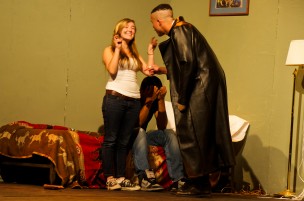
Shannon Welch/Photo Editor
Irish playwright Martin McDonagh’s oeuvre seems to include a motif of the body corporeal—specifically, said body’s maiming. “The Pillowman,” which was produced on Second Stage last winter, features creative mutilations galore, and one of his most famous plays is eponymously titled “The Cripple of Inishmaan.” The violence depicted and, frequently, discussed in his work is shocking—but then, so too is the laughter that often rises from audiences watching his work. “A Behanding in Spokane” is McDonagh’s first play set in America as well as one of his most overtly comical, and both its brilliance and its flaws were in appropriately stark relief in the production directed by Kirby Sokolow ’14 that ran last weekend in the ’92 Theater.
The lights rise on a one-handed man sitting alone onstage in a dilapidated hotel room. This is Carmichael, wanderer, loner, and vigilante, and he’s stopped in this town on his twenty-seven-year-long quest to find his missing left hand, allegedly taken from him by “hillbilly scum” who severed it with judicious use of a freight train. A young couple in this town claim to have a hand that might be his, and he’s waiting for one of them to return with it. The other is tied up, audibly weeping, in the closet.
If Carmichael sounds like a psychopath, he is. And if you think that sounds like an odd launching point for a (admittedly dark) comedy, you’re right. But the hijinks that ensue as the young couple, Marilyn and Toby, attempt to placate their dangerous new acquaintance (ending up chained to the radiator in the process) have their laugh-out-loud moments. Mervyn, the bizarrely unflappable receptionist at the hotel, completes the quartet and mediates in his inscrutable way between the couple and the vigilante.
Paulie Lowther ’13 was convincingly manic in the role of Carmichael, filling the enormous shoes of Christopher Walken (who played the role in its Broadway premiere) admirably. Watching his slow, deliberate motions in the opening moment as he takes out a cigarette, lights it, and smokes with his one hand was a delight. Bringing the same intensity to both the firing of a gun next to his victim’s head and, 30 seconds later, a concerned phone call to his mother makes the role both more believable and more hilarious than it might otherwise be. As the official comic relief, Tim Wolock ’13 was competently strange as Mervyn, a role that showcases some of the strongest writing of the show (one of my favorite lines, from a monologue in which Mervyn discusses his school shooting fantasies vis-à-vis the possibility of rescuing beautiful women: “Of course if I had a choice between her dying and her being tied up, I’d take tied up. I’m not sick”).
Maddy Oswald ’14 delivered a competent performance as Marilyn, one half of the dynamic duo responsible for the plot. The other is the show-stealing (in a good way) Matt Lynch ’15, whose facial expressions, comedic timing, and exuberant whimpering illuminate the much put-upon Toby, who is both the one who began the plot to scam Carmichael and subsequently the main sufferer.
The interplay of these four characters is usually engaging and occasionally outright hilarious. Unfortunately, an inherent weakness of the script and the failings of the performances caused these four to slide all too easily into stereotypes. How much of this was due to McDonagh’s writing and how much came down to the decisions of Sokolow and her creative team is tough to determine. It is certain, though, that after the fifth time Toby explodes into a line where “motherf—er” was every other word (usually with the other characters following suit), the joke had begun to feel stale. The entire Marilyn-Toby dynamic was, in fact, somewhat disappointing: both characters felt so shallowly written, and spent so much time bickering, that their reconciliation at the end of the play was almost difficult to believe.
There were also a couple of technical flaws that were difficult to ignore. “The Final Countdown” began to blare through the speakers at one point for about 10 seconds, in a way that seemed fairly unintentional, not to mention startling. More problematically, Mervyn’s hat, ostensibly the sort a bellboy might wear, was ludicrously large, more along the lines of a fez than an actual cap, and the lighting design occasionally left actors (and therefore audience) in the dark.
Ultimately, “Behanding” was an enjoyable night—there were good moments throughout, and none of the performances were ever less than competent. But it takes a delicate hand to create comedy when life and death hang in the balance, and few parts of this production were carefully calibrated enough to evoke this, leaving a production that was funny and lighthearted, while ultimately lacking depth.
Comments are closed